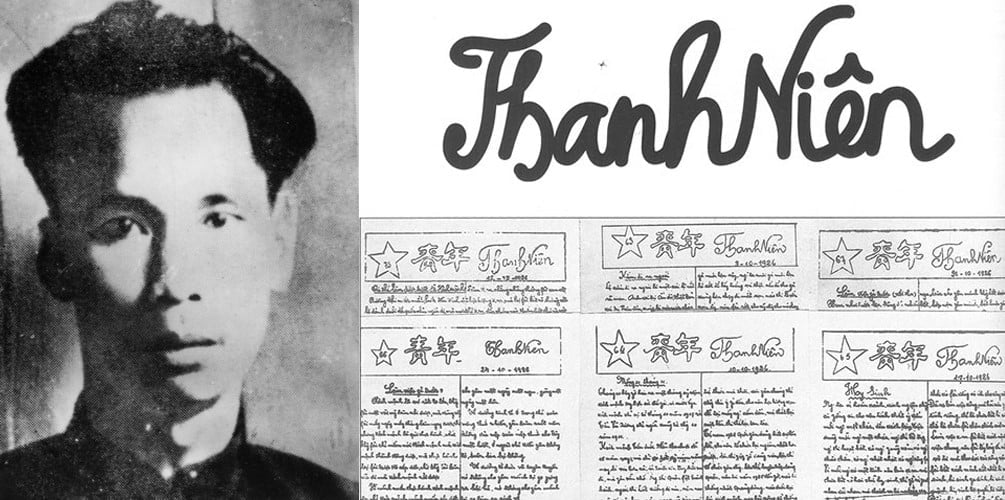On the occasion of the 100th anniversary of the Vietnam Revolutionary Press Day (June 21,25 - June 21, 2025), the reporter had a conversation with journalist Le Duc Sao (nickname Le Tho Binh) - Vice President of the Vietnam Digital Communications Association - to look back on the journey of formation, development and role of revolutionary press in the cause of national liberation and struggle.
Sir, what historical and social context led to the birth of the first revolutionary newspapers in Vietnam?
- Vietnamese - Revolutionary press not born from normal conditions, but is the crystallization of a special historical period when the nation was immersed in the darkness of the colonial capital. At the end of the 19th century - the beginning of the 20th century, traditional patriotic movements failed one after another, the path to save the country fell into crisis.
In that context, the need to propagate new ideas, gather revolutionary forces, cheer patriotism... has led to the emergence of a new form of struggle: journalism.
Along with the influence of the national liberation movement in the world and the growth of a patriotic intellectual class, the press has become a sharp weapon on the ideological front. Newspapers such as Thanh Nien (1925), Lao Dong (1929), Tien Phong, Nguoi Lam Tu... not only provide information, but are the voice of the oppressed nation, a bridge between revolutionary ideals and the people.
In particular, the role of leader Nguyen Ai Quoc is a key point. In 1925, in Guangzhou (China), he founded Thanh Nien - the first newspaper to spread Marxism-Leninism in Vietnam, and directly wrote articles, edited, and trained cadres.
It can be said that the birth of revolutionary journalism is a historical inevitable, a convergence of national requirements, ideals of the times and the intelligence of pioneers.
How did the first newspapers such as Thanh Nien, Lao Dong, Tien Phong, Co Doan... contribute to spreading revolutionary ideas to the masses, sir?
- First of all, those newspapers are a means of conveying revolutionary theories to the hands of workers. Marxism - Leninism is no longer a theory of superstition, but has become a guideline for action, helping the masses understand that they can control their own destiny.
Second, revolutionary journalism is a tool to arouse patriotism and encourage the will to fight. With a familiar, concise, easy-to-understand language, each article is like a call-up, touching the hearts of readers from workers, farmers to young intellectuals.
Third, the press of this period is also a "resolutionary school", a place to train cadres, guide methods of operation and connect organizations. When there was no official Party, journalism was the underlying blood vessel that nurtured the movement, the force that connected people with the same ideals.
Thanh Nien Newspaper under the direction of Nguyen Ai Quoc also plays a special role: connecting the domestic movement with the world revolution, helping people understand that the struggle of our nation is part of the wave of global liberation.

In your opinion, what challenges did the revolutionary press in the early stages overcome to maintain and spread information?
- The sentence is not enough to say it all. The first newspapers operate around the fierce oppression of the colonialists. Not allowed to print publicly, without a distribution system, journalists live in fear, constantly having to change locations, print newspapers in secret caves, caves, even print by hand, write by hand and then pass by word of mouth.
There are almost no technical means, paper and ink are lacking, the majority of the press team are revolutionary cadres who work as part-time reporters, organize fights, and train others. Each newspaper that reaches readers is a journey of intelligence, courage and sacrifice.
The touching thing is that despite such hardship, the newspapers still reach people in the plains, mountains, plantations, factories... and light up in them an unforgettable flame: the desire for independence.

Compared to today's journalism, what is special or deeply different about revolutionary journalism in the early days?
- A lot. But in my opinion, there are some core points.
The first is the fighting spirit. At that time, the press did not have business or entertainment goals, so they lived and fought for ideals. Each line of text is a call to action. Guiding the ideology and serving the revolution is the soul of revolutionary journalism.
Second is the harsh operating conditions. No office, no printing house, no pencil. Only the will, the pen and the spirit are ready to sacrifice.
Third is the team. Most of them are revolutionary soldiers who are not professional journalists in todays sense, but are journalists with a heart and great responsibility to the nation.
Fourth, their writing style is concise, concise, and easy to understand because they write for the working people. Each sentence, each word carries the mission of waking up, cheering, and connecting.
And finally, revolutionary journalism is a part of the revolutionary movement. It is not a sideline, but an ideological center, an organization, an action force.
In your opinion, what should I learn from revolutionary journalism as a journalist today?
- I think, there are three things.
The first is the service spirit. Those who were revolutionary journalists at that time did not write to become famous, did not write to make a living, but wrote to contribute, to contribute to the national congress. Today's journalism needs to maintain that mindset in an era that is easily caught up in rapid flooding and sinking.
Second is courage. Be brave to tell the truth. Courage to protect the right in the midst of many benefits. That courage, in the age of information chaos and digital media pressure, is more necessary than ever.
Third is intelligence. No one can be a good journalist without independent thinking, critical thinking ability and a clear value system. The writer must have a "mental self-respect" to avoid being swept away by the whirlwind of tastes.
And in today's flow when fake news, toxic news, and garbage are seeping through social networks, when the press has to compete with each click, the integrity, fighting spirit, dedication and "writing for the people" of revolutionary journalism need to be aroused and continued.









